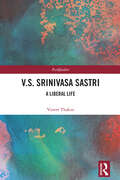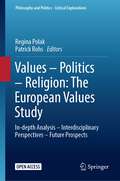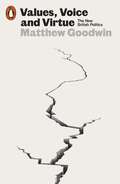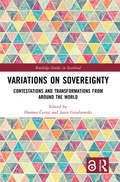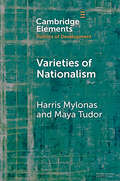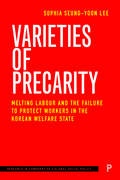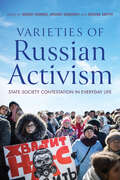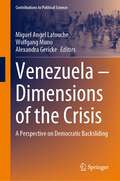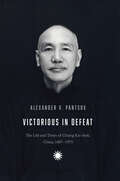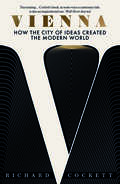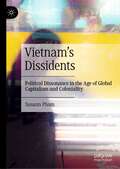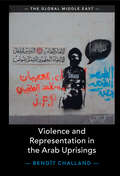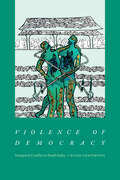- Table View
- List View
V.S. Srinivasa Sastri: A Liberal Life (Pathfinders)
by Vineet ThakurThis book explores the Indian tradition of liberalism through a critical intellectual biography of Valangaiman Sankaranarayana Srinivasa Sastri (1869–1946). A notable politician, diplomat and educationist in colonial India, Sastri was a founding member of the National Liberal Federation and was one of the leading liberals — often dismissed as ‘a body of sycophants and self-seekers’ — of the post-1918 period of Indian pre-independence history. Through Sastri, the book shines a light on the contributions of liberals in Indian political history and challenges the convenient binaries in Indian historiography. Examining the role that liberals like Sastri played in bridging the gap between the officials and the nationalists, it traces the practice of liberal politics in the post-1918 period of Indian nationalist struggle and the broader contours of Indian liberalism. Accessible, comprehensive and scholarly, this book will be of great interest to scholars and researchers of Indian history, especially the nationalist movement, political thought, and South Asian studies.
Vaccine Law and Policy (Law for Professionals)
by Y. Tony Yang Dorit R. ReissVaccine Law and Policy is the first book on vaccine law and policy written specifically for the general public or an educated lay audience without legal background. It offers comprehensive but accessible coverage of key aspects of vaccine law and policy, from product development and intellectual property protections, to regulation, public mandates, and vaccine injury claims. The COVID-19 pandemic sparked a growing interest in learning more about vaccine law and policy, as vaccine development, access, safety and requirements became relevant to hundreds of millions of people worldwide. This book covers United States law in most detail, but the developments and trends described have parallels in many countries, and the United States model and its actions influence others. Some of the most widely used vaccines against COVID-19 - mRNA vaccines – were developed in the United States, and choices made in the United States impact other countries.United States law currently has so much to say about vaccines. From the federal mandate President Biden enacted requiring federal employees to be vaccinated against COVID-19, to the growing number of private employers requiring vaccines to return to work, vaccine law has become a prevalent topic in everyday life. But there is little writing about the legal aspects of vaccines directed at the general public or an educated lay audience without a legal background. Vaccine Law and Policy will not only be invaluable to professionals implementing vaccine law and policy, but also to regulators, public health officials, and scientific researchers.Vaccine Law and Policy covers the wide range of laws and policies that impact the field. These include, among others, regulatory oversight by the FDA, one of the most influential bodies in drug and vaccines regulation worldwide, enforcement, and regulation of the research and development of vaccines; vaccine mandates for children and in the workplace, and medical, religious, and philosophical exemptions to them; patent law and other intellectual property protections such as trademark, trade secret, unfair competition, and copyright law; compensation for vaccine injuries under the National Vaccine Injury Compensation Program (NVICP) and other avenues of liability; safety monitoring; access to vaccines, their promotion, and issues related to funding and costs. The book will also discuss issues related to anti-vaccine movements and vaccine advocacy.
Values – Politics – Religion: In-depth Analysis – Interdisciplinary Perspectives – Future Prospects (Philosophy and Politics - Critical Explorations #26)
by Regina Polak Patrick RohsThis open access book analyses the international data of the European Values Study (EVS 1990 - 2017), with a focus on the impact of religious on political values from empirical as well as theoretical perspectives, i.e. sociology, political and cultural studies, philosophy, ethics, theology and the law. It interprets results from interdisciplinary perspectives, including the viewpoints of social ethics, sociology and cultural studies, law and practical theology. In the political and public as well as media debates of the European Union, the recourse to (above all "European" and also "Christian") values has played a central and controversial role in the field of politics and religion for several decades. This collection is a contribution to a qualified discourse on values in Europe by providing empirical, hermeneutical and ethical criteria for a responsible use of the concept of values. In addition to a comparison of political value systems in Western and Eastern Europe and the possible role of religion in this context, the book also deals with topics such as, f.i., solidarity, economics and values, value formation, and law and values. Additionally, specific population groups such as the socio-culturally marginalized strata are examined more closely. Besides current scientific analyses and interpretations of interest to researchers from various disciplines, this book also offers valuable impulses and suggestions for various multipliers in political, civil society and religious organisations, as well as a sound overview for graduate students.
Values, Voice and Virtue: The New British Politics
by Matthew Goodwin*THE SUNDAY TIMES BESTSELLER**A Financial Times 2023 book to watch*'Forceful ... The fundamental thrust of Goodwin's argument is right ... a new centre ground of British politics is being formed - even if both parties have yet to fully comprehend it' The TimesWhat has caused the recent seismic changes in British politics, including Brexit and a series of populist revolts against the elite? Why did so many people want to overturn the status quo? Where have the Left gone wrong? And what deeper trends are driving these changes?British politics is coming apart. A country once known for its stability has recently experienced a series of shocking upheavals. Matthew Goodwin, acclaimed political scientist and co-author of National Populism, shows that the reason is not economic hardship, personalities or dark money. It is a far wider political realignment that will be with us for years to come. An increasingly liberalised, globalised ruling class has lost touch with millions, who found their values ignored, their voices unheard and their virtue denied. Now, this new alliance of voters is set to determine Britain's fate.Sunday Times bestseller, April 2023
Variations on Sovereignty: Contestations and Transformations from around the World (Routledge Studies in Statehood)
by Hannes Černy Janis GrzybowskiThis edited book explores diverse contestations and transformations of sovereignty around the world. Sovereignty plays a central role in modern political thought and practice, but it also remains fundamentally contested. Depending on the context and perspective, it seems either omnipresent or elusive, liberating or oppressive, fading or resilient. Indeed, if in recent decades sovereignty has been expected to wane, today it is back on the agenda; not as the solid bedrock of modern – international – politics, which it never was, but as variations on a concept and institution that are ever contested and, as a result, constantly transforming. Bringing together perspectives from various disciplines, including International Relations (IR), political theory, geography, law, and anthropology, this volume: • goes beyond debates over the resilience or decline of sovereignty to instead emphasize how precisely the inherent ambiguities, tensions, and contestations in scholarship and practice spark sovereignty’s manifold transformations; • offers three theoretical chapters that examine the illusions, contradictions, transformation, and lasting appeal of sovereignty and the nation-state; • explores sovereignty from various disciplinary perspectives in 11 empirical chapters that highlight its role in different contexts around the world, from the European Union (EU) to the South China Sea, to Western Sahara and Palestine; • problematizes the interplay between theory and practice of statehood and sovereignty, as in the perception of Northern Cyprus as a ‘fake state’, scholars’ promotion of Kurdish ‘statehood’ in Iraq, and studies affirming the ‘Islamic State’. This book will be of much interest to students of statehood, sovereignty, conflict studies and International Relations.
Varieties of Nationalism: Communities, Narratives, Identities (Elements in the Politics of Development)
by Harris Mylonas Maya TudorNationalism has long been a normatively and empirically contested concept, associated with democratic revolutions and public goods provision, but also with xenophobia, genocide, and wars. Moving beyond facile distinctions between 'good' and 'bad' nationalisms, the authors argue that nationalism is an empirically variegated ideology. Definitional disagreements, Eurocentric conceptualizations, and linear associations between ethnicity and nationalism have hampered our ability to synthesize insights. This Element proposes that nationalism can be broken down productively into parts based on three key questions: (1) Does a nation exist? (2) How do national narratives vary? (3) When do national narratives matter? The answers to these questions generate five dimensions along which nationalism varies: elite fragmentation and popular fragmentation of national communities; ascriptiveness and thickness of national narratives; and salience of national identities.
Varieties of Precarity: Melting Labour and the Failure to Protect Workers in the Korean Welfare State
by Sophia Seung-yoon LeeDespite recent achievements in the South Korean economy and development within welfare institutions, new forms of precarious work continue to prevail. This book introduces the concept of ‘melting labour’, which refers to the blurring of boundaries between traditional forms of work and workplace and the dissolution of standard employment relationships. Presenting a theoretical framework at the intersection of ‘melting labour’ and institutional protection of workers, it addresses how and why the Korean welfare state has failed to protect precarious workers. Based on rich, in-depth interviews with over 80 precarious workers in Korea, from subcontracted manufacturing workers to platform workers, it provides a real depiction of how workers lose control over their lives and experience precariousness in labour markets.
Varieties of Russian Activism: State-Society Contestation in Everyday Life
by John P. Burgess Jeremy Morris Regina Smyth Anna Zhelnina Katie L. Stewart Madeline McCann Carola Neugebauer Irina Shevtsova Daniela Zupan Irina Meyer-Olimpieva Katherine Hitchcock Anna A. Dekalchuk Ivan S. Grigoriev Eleonora Minaeva Jan Matti Dollbaum Guzel Yusupova Elena Sirotkina Andrei SemenovDespite decades under Putin's rule, it is too simplistic to assert that authoritarianism in Russia has eliminated activism, especially in relation to everyday life. Instead, we must build an awareness of diverse efforts to mobilize citizens to better understand how activism is shaped by and, in turn, shapes the regime. Varieties of Russian Activism focuses on a broad range of collective actions addressing issues from labor organizing to housing renovation, religion, electoral politics, minority language rights, and urban planning. Contributors draw attention to significant forms of grassroots politics that have not received sufficient attention in scholarship or that deserve fresh examination. The volume shows that Russians find novel ways to redress everyday problems and demand new services. Together, these essays interrogate what kinds of practices can be defined as activism in a fast-changing, politically volatile society. An engaging collection, Varieties of Russian Activism unites leading scholars in the common aim of approaching the embeddedness of civic activism in the conditions of everyday life, connectedness, and rising society-state expectations.
Venezuela – Dimensions of the Crisis: A Perspective on Democratic Backsliding (Contributions to Political Science)
by Wolfgang Muno Miguel Angel Latouche Alexandra GerickeThe book is devoted to the subject of Venezuela's politics and the different dimensions of its longstanding crisis, with various researchers exchanging ideas on the current problems affecting the country. It is the first comprehensive overview on the dimensions of Venezuela’s current crisis written in English, thus filling an important research gap. Especially the participation of international, well-known scholars make it a global enterprise. The book covers historical and theoretical facts surrounding the case of Venezuela and also focuses on the parties and actors that play decisive roles in the conflict. Subjects include the military, public administration, ideology, the opposition, the party landscape along with its crisis and Venezuela's oil policy. Furthermore the book touches upon international and regional aspects: Venezuela's diplomatic relations with the EU, the USA, Cuba and Colombia, respectively. The volume addresses a wider audience, such as scholars on Latin American and especially Venezuelan Politics, International Relations, as well as an interested public, including journalists and politicians.
Vereinbarkeit und Schwangerschaft: Psychische Belastung durch Antizipation? (essentials)
by Okka Zimmermann Lina KolonkoSchwangerschaft sowie Vereinbarkeit von Beruf und Familie werden in der Soziologie in den letzten Dekaden verstärkt sozialwissenschaftlich erforscht, bisher jedoch nicht zusammengebracht. Die Studie arbeitet daher heraus, dass bereits in und vor der Schwangerschaft die grundlegenden Weichenstellungen für Vereinbarkeit gestellt und verhandelt werden; dabei kann die Antizipation von Problemen und Konflikten eine große psychische Belastung darstellen.
Verfahrensprivilegierung aus Gründen des Gemeinwohls: Eine rechtsvergleichende, systematisierende Betrachtung deutscher und französischer verwaltungsverfahrensrechtlicher Regelungen am Beispiel eines Netzboosters (Schriftenreihe des Instituts für Klimaschutz, Energie und Mobilität)
by Ilka DörrfußDiese Arbeit beleuchtet die verfahrensrechtliche Förderung von klimaschutzfreundlichen Projekten, die dem besonders dringenden Infrastrukturausbaubedarf abhelfen können. Dazu untersucht die Autorin die im deutschen und französischen Recht bestehenden Verfahrensprivilegierungen aus Gründen des um daraus Schlüsse für eine Verbesserung der Gesetzgebung zu ziehen. Im Mittelpunkt der Betrachtung steht das im Rahmen einer Novelle zum Energiewirtschaftsgesetz im Jahr 2019 geregelte Verfahren zur Genehmigung sogenannter Netzbooster. Dies sind große Batteriespeicher, die Schwankungen im Stromnetz kurzfristig ausgleichen sollen. Von Bedeutung sind Netzbooster nicht zuletzt im Zusammenhang mit dem Ausbau der Windenergie. Der Band analysiert und systematisiert mittelbare und unmittelbare Verfahrensprivilegierungen im Umwelt- und Planungsrecht und weist auf Handlungsspielräume und Nachbesserungsmöglichkeiten für den Gesetzgeber hin. Den Schwerpunkt im französischen Recht legt die Autorin auf die Commission nationale du débat public (CNDP) und die von ihr organisierte Öffentliche Debatte ( débat public) sowie auf das beschleunigte Enteignungsverfahren aus Gründen des Gemeinwohls ( L'expropriation pour cause d'utilité publique en extrême urgence). Der Rechtsvergleich liefert Grundlagen für eine Reformdiskussion.
Vertical
by Cody GoodfellowA group of urbex explorers breaking into the world&’s tallest skyscraper in Moscow grapple with dangers from all sides in this pulse-pounding cinematic thriller for readers of Gregg Hurwitz and Patrick Hoffman.Michael Foster, Cam Buckley and Maddie Acosta – all former activists in the infamous urbex crew Les Furies. Together they scaled buildings, broke into the spaces no-one else could, and chased a rush that still haunts them. Now though, Michael is stuck recovering from an injury, coding in a dead-end start-up, But Les Furies cannot hide forever. A journalist has uncovered Michael&’s identity and he is being sent anonymous videos of his time in the crew. When he discovers that Cam and Maddie are planning on reuniting the crew one last time, to scale the Korova Tower in Moscow, he is sceptical. But the tower has never been scaled before. Breaking into the world&’s tallest building on Russia Day is too good an opportunity to pass him by. But Michael is about to discover that the vertical city has another purpose, one far more sinister than he could have imagined, and this one final ride for Les Furies might well be the last thing any of them ever do.
Verwaltungswissenschaft: Band 1: Theoretische und methodische Grundlagen
by Eberhard BohneDas Buch bietet eine Einführung in die Verwaltungswissenschaft. Das Buch richtet sich an Studierende aller Fachrichtungen, die sich mit Problemen der öffentlichen Verwaltung befassen, sowie an alle Angehörigen von Verwaltungsberufen innerhalb und außerhalb des öffentlichen Dienstes.
Verwaltungswissenschaft: Band 2: Grundzüge der öffentlichen Verwaltung in Deutschland
by Eberhard Bohne Christian BauerDas Lehrbuch enthält den Besonderen Teil der Verwaltungswissenschaft und knüpft an Bd. 1 mit dem Allgemeinen Teil an. Das Lehrbuch gibt einen systematischen, interdisziplinären Überblick über Aufgaben, Handlungsformen und Organisation, den Öffentlichen Dienst sowie über das Finanz- und Haushaltswesen der öffentlichen Verwaltung in Deutschland. Ausgehend von dem Rollenverhältnis des Bürgers gegenüber der öffentlichen Verwaltung, stellt das Lehrbuch die Haupttypen der öffentlichen Verwaltung dar – Polizei und Ordnungsverwaltung, Wirtschaftsaufsicht, Umweltaufsicht, Leistungsverwaltung, Infrastrukturverwaltung und Ko-Produktion öffentlicher Leistungen durch Bürger und öffentliche Verwaltung. Die Darstellung verbindet eine ökonomische, politische und rechtliche Perspektive. Bd. 1 und 2 bilden zusammen ein umfassendes, systematisches Kompendium der Verwaltungswissenschaft für Studium, Lehre und Praxis.
Victorious in Defeat: The Life and Times of Chiang Kai-shek, China, 1887-1975
by Alexander V. PantsovAn extensively researched, comprehensive biography of Chinese Nationalist leader Chiang Kai-shek, one of the twentieth century&’s most powerful and controversial figures Chiang Kai-shek (1887–1975) led the Republic of China for almost fifty years, starting in 1926. He was the architect of a new, republican China, a hero of the Second World War, and a faithful ally of the United States. Simultaneously a Christian and a Confucian, Chiang dreamed of universal equality yet was a perfidious and cunning dictator responsible for the deaths of over 1.5 million innocent people. This critical biography is based on Chiang Kai-shek&’s unpublished diaries, his extensive personal files from the Russian archives, and the Russian files of his relatives, associates, and foes. Alexander V. Pantsov sheds new light on the role played by the Russians in Chiang&’s rise to power in the 1920s and throughout his political career—and indeed the Russian influence on the Chinese revolutionary movement as a whole—as well as on Chiang&’s complex relationship with top officials of the United States. It is a detailed portrait of a man who ranks with Stalin, Roosevelt, Hitler, Churchill, and Gandhi as leaders who shaped our world.
Vielfalt in der öffentlichen Verwaltung: Strategien und Konzepte für ein wirksames Diversity Management in Kommunen, Ländern und Bund
by John Meister Matthias HörmeyerDieses Buch zeigt, wie Diversity Management in der öffentlichen Verwaltung gelingt und Vielfalt in Kommunen, Ländern und Bund erfolgreich gefördert wird. Die öffentliche Verwaltung steht vor zahlreichen Herausforderungen: Demografischer Wandel, Arbeitskräftemangel, Klimawandel, Digitalisierung, Krisenbewältigungen, veränderte Ansprüche der Gesellschaft. Eine zeitgemäße Antwort darauf ist Diversity Management. Mit Diversity kann sich die öffentliche Verwaltung zukunftsorientiert verändern. Sie kann attraktive Arbeitgeberin sein, empathischer auf die Bedürfnisse der Bürger*innen eingehen und den Herausforderungen der Zukunft besser begegnen. Renommierte Fachbeitragsautor*innen zeigen, dass Diversity wichtige Bausteine liefert, um die erforderliche Handlungsfähigkeit der öffentlichen Verwaltung nachhaltig zu sichern. Dazu werden vielfältige Konzepte, Ideen, Praxisbeispiele und Erfahrungsberichte vorgestellt, wie die öffentliche Verwaltung neue und innovative Wege gehen kann, um Diversity Management erfolgreich umzusetzen.Mit Beiträgen von: Paula Lina AuksutatSarina BadafrasBelma BekosCigdem BernIsabel CollienSonja DudekIrina EckardtDr. Klaus EffingStefan Fuerst Julia GöpelProf. Dr. Regine GramlAna-Cristina GrohnertMarc GroßInes HansenTessa HillermannMatthias Hörmeyer (Hrsg.)Hans W. JablonskiKathleen JägerJana JanzePeter JanzeJan KlumbIbrahim KöranAnika KrellmannEdwin MeierJohn Meister (Hrsg.)Sabine MeisterBaris ÖnesZehra ÖztürkMelanie PetersonMaria PozderGabriel RathMeike ReuterAlice RittgerodtMagdalena RoglJochen SchiffmannRouven-Alexander SlabikMagdalena WeißGülcan Yoksulabakan-ÜstüayChristian Zierau
Vienna: How the City of Ideas Created the Modern World
by Richard CockettHow can one European capital be responsible for most of the West&’s intellectual and cultural achievements in the twentieth century? Viennese ideas saturate the modern world. From California architecture to Hollywood Westerns, modern advertising to shopping malls, orgasms to gender confirmation surgery, nuclear fission to fitted kitchens—every aspect of our history, science, and culture is in some way shaped by Vienna. The city of Freud, Wittgenstein, Mahler, and Klimt was the melting pot at the heart of a vast metropolitan empire. But with the Second World War and the rise of fascism, the dazzling coteries of thinkers who squabbled, debated, and called Vienna home dispersed across the world, where their ideas continued to have profound impact. Richard Cockett gives us the entirety of this extraordinary story. Tracing Vienna&’s rich intellectual history from psychoanalysis to Reaganomics, Cockett encompasses everything from the communist rebels of Red Vienna to the neoliberal economists of the Austrian School. This is the panoramic account of how one city made the modern world—and how we all remain inescapably Viennese.
Vietnam’s Dissidents: Political Dissonance in the Age of Global Capitalism and Coloniality
by Susann PhamThis book is the first ethnography on Vietnam’s contemporary dissident movement. As a country that became known and is still remembered as one of the last remnants of Communist revolutions, Vietnam has managed to lift itself from one of the poorest war-torn post-colonies to one of the fastest growing market economies in Southeast Asia. Yet, while holding on to the legacy of a communist-led liberation movement, the present-day Communist Party of Vietnam (CPV) finds itself subject to political challenges from below. In recent years, dissident voices critical of the party-state's malgovernance over social, economic and environmental issues have mushroomed across classes, generations and provinces. Based on extensive ethnographic data, this book explores distinct political practices and political ideas of Vietnam's dissidents. It examines different anti-capitalist and anti-authoritarian practices of democracy, labour, peasant and religious activists and reveals that anti-capitalist and anti-authoritarian practices are—at times—motivated by nationalist, anti-communist and statist ideas and ideologies. Understanding this dissonance between political practices and political ideas within the context of global capitalism and coloniality lies at the heart of this book.
Viewing Velocities: Time in Contemporary Art
by Marcus VerhagenContemporary art and the culture of speedHow have artists responded to our market-driven, tech-enabled culture of speed? Viewing Velocities explores a contemporary art scene caught in the gears of 24/7 capitalism. It looks at artists who embrace the high-octane experience economy and others who are closer to the slow movement. Some of the most compelling artworks addressing the cadences of contemporary work and leisure play on distinct, even contradictory conceptions of time. From Danh Vo's relics to Moyra Davey's photographs of dust-covered belongings, from Roman Ondak's queuing performers and Susan Hiller's outdoor sleepers to Maria Eichhorn's art strike and Ruth Ewan's giant reconstruction of the French revolutionary calendar, artists have drawn out aspects of the present temporal order that are familiar to the point of near-invisibility, while outlining other, more liberating ways of conceiving, organising and experiencing time.Marcus Verhagen builds on the work of theorists Jonathan Crary, Hartmut Rosa and Jacques Rancière to trace lines of insurgent art that recast struggles over time and history in novel and revealing terms.
Violence against Women in and beyond Conflict: The Coloniality of Violence (Gender in a Global/Local World)
by Julia Carolin SachsederViolence against Women in and beyond Conflict explores the processes and structures that underlie sexual violence and internal displacement in armed conflict, utilizing extensive ethnographic research to provide cutting-edge insights. The author argues that the key to understanding violence against women lies at the intersection of transnational capital, race, and gender – that not only contribute to its production but also to its persistence. The book uses the Colombian armed conflict as the primary case study but develops a broader framework for theorizing the relationship between the global political economy, the history of coloniality, and intersectional constructions of gender and race with regard to conflict and violence. It offers an understanding of violence against women as not isolated from, but part and a symptom of, a larger system of political, social, and economic inequality that is rooted in colonialism, and exploited and exacerbated by transnational capital relations. The author also shows how (post)colonial power asymmetries, the state, and other non-state actors, most prominently paramilitaries, are involved in this relationship of violence. The book highlights the implications for meaningful and sustainable peace in post-conflict contexts. This book will be of great interest to students and scholars of international relations, gender studies, and conflict studies; as well as policymakers, (non)governmental organizations, and practitioners interested in conflict and security.
Violence and Peace in Sacred Texts: Interreligious Perspectives
by Helen Paynter Maria PowerThis volume brings together 11 experts from a range of religious backgrounds, to consider how each tradition has interpreted matters of violence and peace in relation to its sacred text. The traditions covered are Hinduism, Buddhism, Judaism, Christianity, Islam and Sikhism. The role of religion in conflict, war, and the creation of peaceful settlements has attracted much academic attention, including considerations of the interpretation of violence in sacred texts. This collection breaks new ground by bringing multiple faiths into conversation with one another with specific regard to the handling of violence and peace in sacred texts. This combination of close attention to text and expansive scope of religious inclusion is the first of its kind.
Violence and Representation in the Arab Uprisings (The Global Middle East #21)
by Benoît ChallandProviding a longue durée perspective on the Arab uprisings of 2011, Benoît Challand narrates the transformation of citizenship in the Arab Middle East, from a condition of latent citizenship in the colonial and post-independence era to the revolutionary dynamics that stimulated democratic participation. Considering the parallel histories of citizenship in Yemen and Tunisia, Challand develops innovative theories of violence and representation that view cultural representations as calls for a decentralized political order and democratic accountability over the security forces. He argues that a new collective imaginary emerged in 2011 when the people represented itself as the only legitimate power able to decide when violence ought to be used to protect all citizens from corrupt power. Shedding light upon uprisings in Yemen and Tunisia, but also elsewhere in the Middle East, this book offers deeper insights into conceptions of violence, representation, and democracy.
Violence in Extreme Conditions: Ethical Challenges in Military Practice
by Eric-Hans Kramer Tine MolendijkAs an organization operating under extreme conditions, the military is often confronted with destructive behavior from individuals, organizations, and societies. Written by experts from a variety of disciplines, this open access book reflects on confrontations with violence under extreme conditions and the various challenges that arise.By examining real first-hand accounts of soldiers’ deployments, the contributions shed new light on the multifaceted and sometimes hidden dynamics of destructive violent behavior and offer an ethical reflection on military practices. In addition, they address topics such as moral decision-making in violent contexts, military trauma, organizational change, and military ethics education.The interdisciplinary exploration of these topics has been the primary focus of Désirée Verweij, who was the Chair of Military Ethics at the Netherlands Defence Academy from 2008 to 2021. The contributions in this book are written in honor of her scholarly achievements and help to ensure that these important issues continue to receive attention. The book will appeal to scholars of military studies, organizational studies and military ethics, and to professionals and decisionmakers in military organizations.
Violence in Families: Integrating Research into Practice (Advances in Preventing and Treating Violence and Aggression)
by Peter SturmeyThis book examines the nature, prevention, and treatment of violence within families. It reviews the definition of contemporary families, emphasizing various structures, including nuclear families, reconstituted families, gay and lesbian families, and recent immigrant families. In addition, the volume describes the nature of and risk factors for family violence from the perspectives of both victims (e.g., infants, children, seniors) and perpetrators (e.g., adolescent family members, women). It identifies the implications and explores strategies for prevention, treatment, and services. In addition, the volume directly addresses practice and evidence-based interventions for individual perpetrators, family interventions, interventions for victims and systemwide interventions (e.g., those involving the courts, police, and national policy). Chapters review the best available quality evidence from randomized controlled trials, systematic reviews, meta-analyses, research syntheses, and evidence-based recommendations from expert panels and government agencies. Case studies illustrate the application of evidence-based practice to violence within the family to demonstrate the effectiveness of the intervention. Topics featured in this book include:Definition and conceptualization of family.Definition and measurement of as well as risk factors for family violence.Family violence in various traditional and nontraditional families.Prevention strategies as well as Individual and family treatments for perpetrators and victims of family violence.Social policy and legal interventions for family violence. Violence in Families is a must-have resource for researchers, professors, and graduate students as well as clinicians, therapists, and other professionals in developmental psychology, family studies, forensic psychology, criminology/criminal justice, public health, psychotherapy/counseling, psychiatry, social work, educational policy and politics, health psychology, nursing, and behavioral therapy/rehabilitation.
Violence of Democracy: Interparty Conflict in South India
by Ruchi ChaturvediIn Violence of Democracy Ruchi Chaturvedi tracks the rise of India’s divisive politics through close examination of decades-long confrontations in Kerala between members of the Communist Party of India (Marxist) and supporters of the Hindu nationalist Rashtriya Swayam Sevak Sangh and the Bharatiya Janata Party. Drawing on ethnographic fieldwork and extensive archival research, Chaturvedi investigates the unique character of the conflict between the party left and the Hindu right. This conflict, she shows, defies explanations centering religious, caste, or ideological differences. It offers instead new ways of understanding how quotidian political competition can produce antagonistic majoritarian communities. Rival political parties mobilize practices of disbursing care and aggressive masculinity in their struggle for electoral and popular power, a process intensified by a criminal justice system that reproduces rather than mitigating violence. Chaturvedi traces these dynamics from the late colonial period to the early 2000s, illuminating the broader relationships between democratic life, divisiveness, and majoritarianism.
